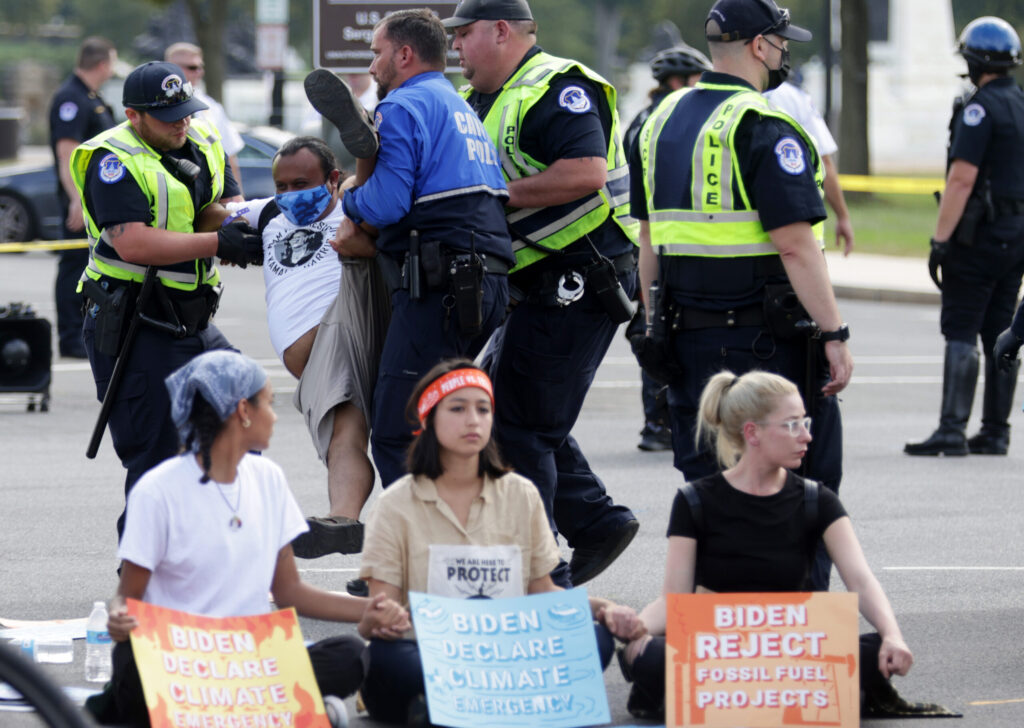Experts warn that a second Donald Trump presidency could amplify threats to free speech and protest freedoms. Concerns focus on Trump’s inflammatory rhetoric and past actions, such as deploying federal agents against Black Lives Matter protests in 2020.
Trump has often vowed to use the military to suppress dissent, describing political opponents as “the enemy from within” (source). John Langford, a First Amendment lawyer with Protect Democracy, highlighted Trump’s history of suppressing dissent as indicative of a democratic decline.
Criticism comes from varied quarters, including Trump’s former chief of staff, John Kelly, who labeled Trump as potentially fascistic. Thirteen former Trump officials support Kelly’s assessment (source).
The crackdown on U.S. protest freedoms is also driven by state laws, corporate influence, and lawsuits targeting climate activists. However, Trump’s rhetoric might create a hostile environment for dissent, sparking fears among climate groups.
A recent Supreme Court ruling granting former presidents immunity for actions within their constitutional duties intensifies concerns over executive overreach. Charlie Cray from Greenpeace notes the court’s support could enable Trump to wield excessive power.
Executive Overreach and Chilling Dissent
The ACLU released memos analyzing potential civil liberties impacts under Trump and Harris administrations, highlighting Trump’s previous executive overreach (source). ACLU director Anthony Romero contrasted the two administrations, emphasizing differing impacts on fundamental rights.
Russell Vought, a Trump ally, has suggested invoking the Insurrection Act to deploy the military against protesters. The act’s vague language grants sweeping presidential discretion, raising concerns about civil liberties, according to Joseph Nunn of the Brennan Center for Justice.
Ben Wizner of the ACLU warned that Trump’s unpredictability necessitates preparing for extreme scenarios. His previous presidency faced internal resistance to extreme measures, but a compliant administration could alter this dynamic.
SLAPP Suits and Legal Persecution
Climate activists face increasing legal challenges, such as costly lawsuits and accusations of domestic terrorism. Greenpeace is contesting a $300 million lawsuit from Energy Transfer, which they argue is a SLAPP suit aimed at stifling dissent.
SLAPP suits are designed to burden activists with legal fees, and there is a growing need for stronger anti-SLAPP protections, including federal laws to defend protesters, according to Wizner. Currently, anti-SLAPP legislation exists in 34 states and D.C.
Energy Transfer, a top Trump donor, exemplifies the close ties between fossil fuel interests and political figures. Critics warn of increased threats to environmental advocacy under a potential Trump administration.
Critical Infrastructure and Protest Legislation
Several states have passed laws curbing protest freedoms, often influenced by fossil fuel industry proposals. These laws target demonstrations at “critical infrastructure” sites, such as oil facilities (source).
Nick Robinson from the ICNL noted these laws often emerge in response to social movements, with precedents set during the Dakota Access Pipeline protests. The fossil fuel industry’s influence is a primary threat to protest freedoms, says organizer Russell Chisholm.
Despite bipartisan support for anti-protest laws, activists highlight systemic issues where political figures prioritize industry interests over community welfare. Juan Mancias, an opponent of natural gas projects in Texas, calls for a focus on protecting essential resources like clean water and air.
Bipartisan Threats to Protest Freedoms
While Trump is seen as a significant threat, the ACLU warns that both parties have compromised First Amendment rights. Recent laws, such as anti-BDS measures against boycotts, illustrate bipartisan tendencies to limit protest freedoms.
Environmental activists remain concerned about corporate influence on lawmakers across the political spectrum, arguing that fossil fuel money affects both Democrats and Republicans. Trump presents a more immediate threat, but systemic challenges persist regardless of administration.
Original Story at insideclimatenews.org
